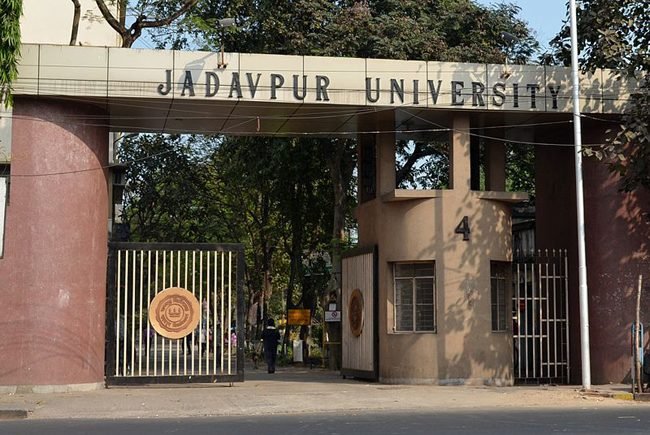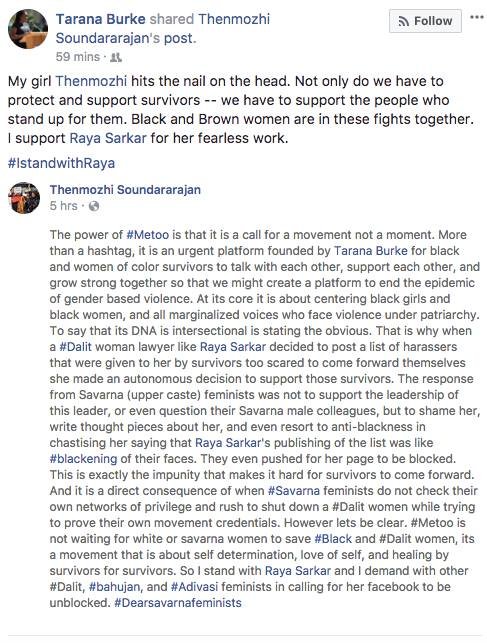On Monday, a woman law student, Raya Sarkar, put up a Facebook post naming two academics who had sexually harassed their students. She then invited others also to list sexual predators in academia. “If any one knows of academics who have sexually harassed/were sexually predatory to them or have seen it first-hand PM me and I’ll add them to the list,” the second part of the post said.
Within no time, the post hit a chord and 60 names of prominent academics from top institutions across India and abroad were added to the list. Since then, it has gone viral on social media.

The list
The list includes several big names from some of India’s top institutions. Among them are 12 professors at Jadavpur University, nine at Delhi University, three each from Film and Television Institute (FTII) and SRFTI, two professors at Jawaharlal Nehru University (JNU).
Besides these, other academics from Oxford University, St. Xavier’s College, Kolkata, University of California Santa Cruz, Ambedkar University Delhi, EFLU – Hyderabad, Christ University have also been named.

Abhijit Gupta, a professor at Jadavpur University, whose name appears on the list, responded in a statement on Facebook:
Why she made the list
According to Sarkar, most incidents are first-person accounts of people molested/sexually harassed by the people who have been put on the list. Sarkar says she has collected screenshots of chats, WhatsApp messages, emails, call recordings that corroborate the testimonies of the victims.
A former student of OP Jindal Global University, Sarkar says her Singaporean nationality and the fact she resides in the USA would save her from potential defamation suits.
In an interview with a popular website, Sarkar explains her reasons behind creating the list.
The #metoo campaign inspired me to do this, and I took this opportunity to create a list to warn students using firsthand accounts from survivors. The list is primarily for students to be wary of their professors, because in my opinion, knowing how college administrations function, harassers will continue to hold their positions of power.
Support and criticism
The response to the publication of the list has been tremendous. Sarkar says an overwhelming number of victims have come forward, with evidence in hand, informing her that a Professor sexually harassed them.
The publication of the list, however, has split the academic world in the middle. Many have supported Sarkar’s initiative but many academics and prominent feminists in India and other parts of South Asia are up in arms.
Eminent Supreme Court lawyer and feminist intellectual Karuna Nandy wrote on Twitter:
Question to feminists supporting the name/shame list: why is some process to establish truth not required? Genuinely trying to understand.
— Karuna Nundy (@karunanundy) October 25, 2017
Similarly, many questioned Sarkar’s methods saying that not following a “due process” undermines feminists’ long struggles for gender justice.
Prominent feminist activist Kavita Krishnan writes in a piece:
By accepting the politics of lists in one context, are we not robbing ourselves of the argument of due process that we make in the other contexts of power?
However, many expressed support for Sarkar’s methods saying only radical methods can fight the malaise of sexual violence against women.
Author Meena Kandaswamy expressed support for Sarkar’s list in a series of posts on Facebook:
Even Tarana Burke, the woman who created the #MeToo movement, where women on social media recounted harrowing stories of sexual abuse they faced at the hands of different men, said in a statement that she “supports Raya Sarkar for her fearless work”.

In a statement, digital feminist platform Feminism in India, supported Sarkar’s initiative:
“We stand in solidarity with Raya Sarkar, who has compiled a crowdsourced list of male academics and professors accused of sexual harassment… as well as the survivors who contributed to it. In the culture of silencing and victim-blaming surrounding sexual harassment allegations, it is of utmost importance to amplify the voices of survivors and most importantly, believe them. As the #MeToo campaign showed, social media can be a powerful and democratic agent of change and community kinship, and we don’t believe that using it to ‘name and shame’ is a bad thing…”
Some prominent Indian women activists, however, voiced reservations. A post signed by women activists such as Ayesha Kidwai, Kavita Krishnan, Nivedita Menon on blog Kafila said:
“We are dismayed by the initiative on Facebook in which men are being listed and named as sexual harassers with no context or explanation. One or two names of men who have been already found guilty of sexual harassment by due process are placed on par with unsubstantiated accusations. It worries us that anybody can be named anonymously, with lack of answerability.”
Sarkar’s post comes just days after the #MeToo campaign went viral. This was in the wake of American film producer Harvey Weinstein being accused by over 30 actresses of sexual harassment.

















